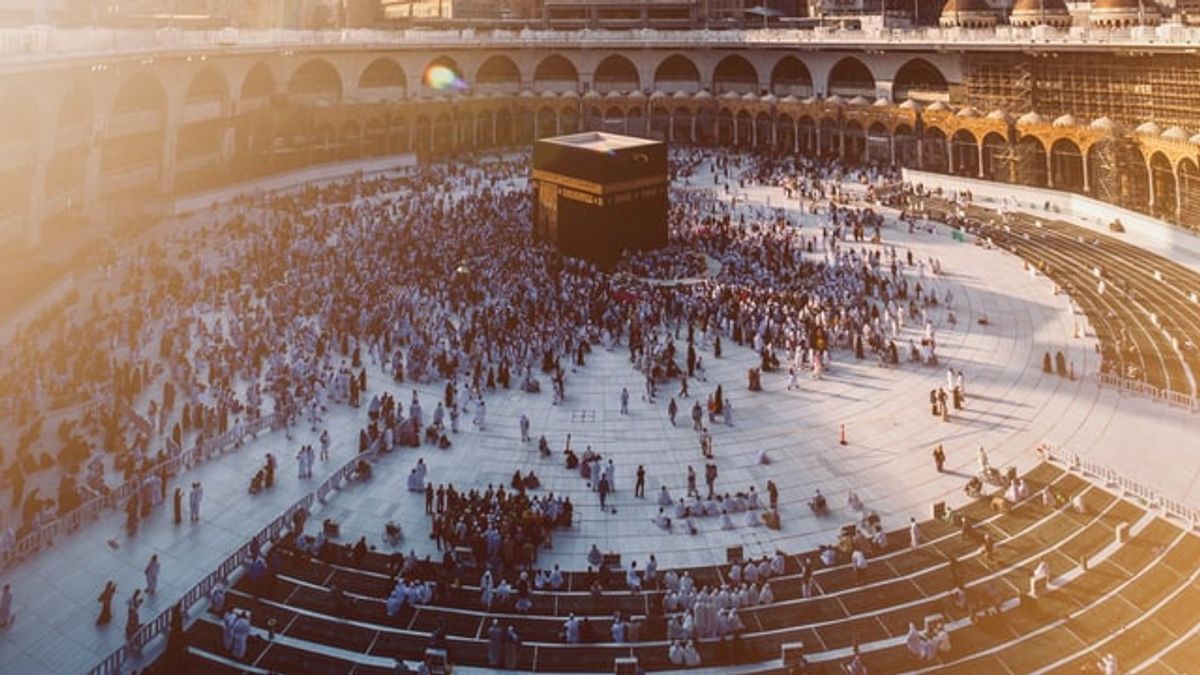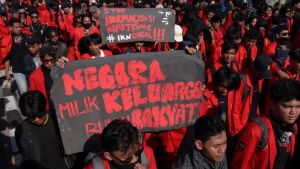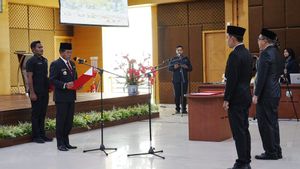JAKARTA - The government officially canceled the implementation of Hajj 1442 H/2021 AD and ensured not to send Indonesian pilgrims to Saudi Arabia.
Minister of Religion Yaqut Cholil Qoumas stated that this decision took into account the health and safety of the congregation in the midst of the Corona Virus Disease-19 (COVID-19) pandemic which is still afflicting the world.
"Because it is still a pandemic and for the safety of the congregation, the Government has decided that this year it will not send back Indonesian Hajj pilgrims," said the Minister of Religion at a press conference at the Ministry of Religion's Office, Jakarta, Thursday, June 3. This decision was taken after holding a meeting with the Chairman of Commission VIII DPR Yandri Susanto, as well as a number of representatives from the Ministry of Health, Ministry of Foreign Affairs, Ministry of Transportation, BPKH, Association of Hajj and Umrah Organizers, Hajj and Umrah Guidance Group Forums, as well as representatives from MUI and other Islamic Organizations. 660 of 2021 concerning Cancellation of Departures for Hajj Pilgrims in the Organization of the Hajj in 1442 H/2021 AD," continued Gus Yaqut, his nickname. Minister of Religion Yaqut emphasized that this decision had gone through an in-depth study. The Ministry of Religion has held discussions with Commission VIII of the DPR on June 2, 2021.
Observing the safety of the hajj pilgrims, the technical aspects of preparation, and the policies taken by the Saudi Arabian government authorities, Commission VIII of the DPR in the conclusion of the working meeting also conveyed that it respects the decisions that will be taken by the Government. "Commission VIII of the DPR and the Ministry of Religion, together with other stakeholders will work together to disseminate information. and good and massive public communication regarding policies for the Implementation of the Hajj 1442 H/2021 AD," said the Minister of Religion.
The Ministry of Religion, explained Gus Yaqut, has also conducted a series of studies with the Ministry of Health, Ministry of Foreign Affairs, Ministry of Transportation, and other related institutions. "Last night, we also held a virtual meeting with MUI and Islamic organizations to discuss this policy. Alhamdulillah, everyone understands that in a pandemic, the safety of the congregation's soul must be prioritized. Islamic organizations will also participate in socializing this policy for the benefit of the congregation," said the Minister of Religion. "For the support of Commission VIII, related K/L, and also Islamic organizations, I express my highest appreciation -high," he continued. The government considers that the COVID-19 pandemic, which is still engulfing almost all countries in the world, including Indonesia and Saudi Arabia, can threaten the safety of the congregation. Moreover, the number of new cases of COVID-19 in Indonesia and several other countries in the past week has not shown a significant decline. Daily cases in Indonesia from May 26 to 31 for example, the average is still above 5,000. There was a slight decline on June 1, 2021, but still at 4,824. Meanwhile, daily cases in the 11 largest pilgrim-sending countries as of June 1 were also relatively high with the following data: Saudi (1,251), Indonesia (4,824), India (132,788), Pakistan (1,843), Bangladesh (1,765), Nigeria (16) , Iran (10,687), Turkey (7,112), Egypt (956), Iraq (4,170) and Algeria (305). For neighboring Indonesia, the highest daily cases as of June 1, 2021 are Malaysia (7,105), followed by the Philippines (5,166) and Thailand (2,230). Singapore, although the daily case at the beginning of June was 18, has decided not to send pilgrims, while Malaysia has imposed a lockdown. According to the Minister of Religion, religion teaches that protecting the soul is an obligation that must be prioritized. Law No. 8 of 2019 concerning the Implementation of Hajj and Umrah also provides a mandate to the government to carry out protective duties. Therefore, the health, safety, and security of the congregation are the main factors. “These are all the basis for consideration in setting policies. Moreover, this year there is also the spread of a new variant of COVID-19 that is developing in a number of countries," explained the Minister of Religion. "The implementation of the Hajj is an activity that involves many people which has the potential to cause crowds and an increase in new cases of COVID-19," he added. The Saudi Arabian government, said the Minister of Religion, to this day which coincides with 22 Shawwal 1442 H, has also not invited the Indonesian Government to discuss and sign a Memorandum of Understanding on Preparations for the Hajj pilgrimage in 1442 H/2021 AD. So, until now, no country has received a quota, because the signing of the Memorandum of Understanding has not been carried out," said the Minister of Religion. This condition has an impact on the preparation of the Hajj pilgrimage. This is because the various preparations that have been made have not yet been finalized. For domestic services, such as flight contracts, payment of pilgrimage travel costs (Bipih), preparation of travel documents, preparation of officers, and implementation of ritual guidance, all of which can only be completed if the amount of the hajj quota has been received from Saudi. Likewise, the preparation of services in Saudi, both accommodation, consumption, and transportation, cannot be finalized because there is no certainty about the amount of the quota, including the scheme for implementing the Hajj health protocol, and others. "Those are all usually regulated and agreed upon in the MoU between the country sending the pilgrims and Saudi. The implementation of the hajj pilgrimage in 1442H/2021M has not yet been carried out," he said. "In fact, with a quota of 5 percent of the normal quota, the preparation time needed is not less than 45 days," he continued. Another thing to consider is the impact from the implementation of health protocols that are strictly enforced by the Saudis due to the pandemic situation. The restrictions are even included in the implementation of worship. Reflecting on the implementation of Umrah earlier this year, the restrictions include a ban on praying in Hijir Ismail and praying around Multazam. Shaf when establishing prayer is also set apart. There are also restrictions on congregational prayers, both in the Grand Mosque and the Prophet's Mosque. "Restrictions on the period of stay will also have an impact, especially on the implementation of Arbain. Because the stay in Medina is only three days, it is certain that the congregation cannot undergo Arbain worship," he explained. The cancellation of the congregation's departure applies to all Indonesian citizens (WNI) both with an Indonesian hajj quota and other hajj quotas. Pilgrims, regular and special Hajj, who have paid off the Hajj Travel Costs (Bipih) in 1441 H/2020 M, will become pilgrims for the Hajj pilgrimage in 1443 H/2022 AD. concerned. So the congregation's money is safe. Hajj funds are safe. Indonesia also has no outstanding debts or bills related to Hajj. Information about unpaid bills is a hoax," he said. The Minister of Religion expressed his sympathy to all hajj pilgrims affected by the COVID-19 pandemic this year. To facilitate access to public information, apart from Siskohat, the Ministry of Religion has also prepared a communication post at the Directorate General of Hajj and Umrah. The Ministry of Religion is also preparing the WA Center which will be released in the near future. "This decision is bitter. But this is the best. Hopefully this COVID-19 exam will end soon," concluded the Minister of Religion.
The English, Chinese, Japanese, Arabic, and French versions are automatically generated by the AI. So there may still be inaccuracies in translating, please always see Indonesian as our main language. (system supported by DigitalSiber.id)
Most Popular Tags
#Prabowo Subianto #New Year #pdip #Hasto Kristiyanto #nataru #NatalPopular
27 Desember 2024, 17:16
27 Desember 2024, 18:00













